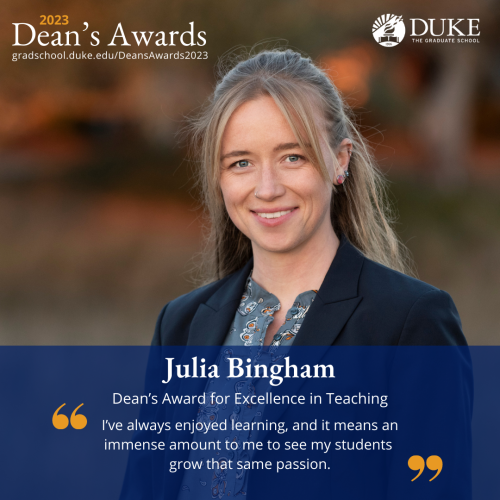
Julia Bingham
Dean’s Award for Excellence in Teaching
Ph.D. Candidate in Marine Science & Conservation

BIO
Julia Bingham is a Ph.D. candidate in Marine Science and Conservation at the Duke University Marine Lab. Her research examines the intersection of knowledge, values, equity, and power in fishery governance and coastal management through political ecology and critical human geography. Her dissertation research is based on Vancouver Island, where she is partnered with Tla-o-qui-aht First Nations and Ha’oom Fisheries Society. She received her bachelor's in biology with a marine biology focus and international studies at Oregon State University, where she developed an independent research project studying gooseneck barnacles at the OSU Novak Lab.
Bingham is currently the instructor of record for Marine Policy through a Bass Instructional Fellowship. She has served as a teaching assistant for numerous courses at the Nicholas School for the Environment and the Duke Law School. She has also co-designed a graduate student seminar with Associate Professor Grant Murray.
Bingham is attentive to student engagement and seeks to support individual student learning through adaptive, accessible learning strategies and direct student communication. She has committed to supporting a diverse and inclusive environment by engaging in student outreach and mentorship opportunities that specifically support students of marginalized and underrepresented backgrounds. For instance, she was the program coordinator for the Van Dover Inclusivity Travel Award, a volunteer educator with the Community Science Initiative at the Duke Marine Lab, as well as an activity leader and panelist for Growing Equity in Science and Technology. Additionally, Bingham is completing a Certificate in College Teaching.
ON TEACHING
What do you enjoy about teaching?
I enjoy facilitating the development of students’ ideas, skills, and interests, and seeing them enthusiastically engage in class. I love when students bring their own perspectives, creativity, and curiosity to a classroom to contribute critically to discussions and actively, collaboratively build their knowledge with their peers. I’ve always enjoyed learning, and it means an immense amount to me to see my students grow that same passion and carry it forward in their academic engagement.
What resources or strategies have you found to be helpful in your development as a teacher?
I actively encourage direct feedback from my students so that I can continually adjust and improve my teaching to better serve their learning and accessibility needs, and to produce an enjoyable learning environment. I’ve also benefited from the opportunity to engage in coursework in developing pedagogy through Duke’s Certificate for College Teaching Program. I’ve especially appreciated direct support and mentorship I’ve received from multiple faculty at the Nicholas School of the Environment and the Duke Marine Lab with whom I’ve worked as a teaching assistant or co-instructor, and who allowed me to build my skills in developing lessons, lectures, and assignments in their classes.
What does a successful classroom look like? How do you go about creating such a setting?
To me, a successful classroom supports active, thoughtful student engagement alongside creativity, collaboration, and skill development. In a successful classroom, students can access what they need to learn, while also enjoying the learning process and growing as compassionate and critical scholars and citizens. I aim to encourage students’ creative engagement with course content in a way that deepens their learning and can be adaptive in format.
For example, as a TA for Dr. Gill’s Marine Spatial Planning course in 2019, I developed a tabletop role-playing game to engage students in the challenges of coastal management. I built the game using Legos and 3-D printed figures to symbolize various ecosystems, species, industries, and communities, and to provide a tangible space to engage with relevant ideas from lecture content. Students took on various stakeholder roles to negotiate management decisions and respond to the impacts of those decisions, human activity, or natural disasters. Students were creative in building collaborative approaches to problem solving in their roles and expressed that they gained a deeper and more nuanced understanding of intersecting challenges in marine and coastal management. Importantly, they also had fun.
As a primary instructor of record for Marine Policy, I offered students the option to take creative liberty in their personal reflection assignments. Several students produced exceptional artwork and expressed that this format was more useful than written reflection exercises to spend time thinking about what they were learning and how or why it mattered. This practice carried over into how much effort, design, and careful thought students put into their final projects. I believe these types of activities facilitate enjoyment of learning, thoughtful classroom engagement, and deep understanding of complex concepts.
IN THEIR WORDS
Excerpts from Bingham’ nomination
“Julia has demonstrated not only academic excellence but also an ability to lead well and work productively with those around her in a wide range of situations, from communities to academic settings. She is motivated by a passion for environmental conservation and a belief that science-based approaches to management must be driven, and supported, by local communities. She is engaged in the local community on and off campus and, not surprisingly, is well respected by her peers and those that she works with. She is intensely curious about expanding her understanding of the different challenges central to rural and small-scale, resource dependent communities and pursues her work sincerely, passionately, seriously, and with commitment.”
“Students highlighted her helpfulness, responsiveness, approachability, engagement, and communication. They also mentioned how helpful she was in providing information about possible pathways after undergraduate studies.”
“Julia is an excellent candidate for the Dean’s Award for Excellence in Teaching due to her skills as an educator, her dedication to creating a welcoming and inclusive environment, and her dedication to teaching and mentorship as a future career. She has sought out teaching and mentorship opportunities far beyond her service requirements as a graduate student in the Nicholas School of the Environment.”